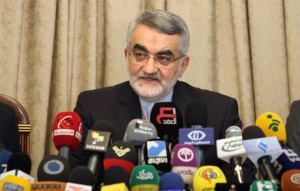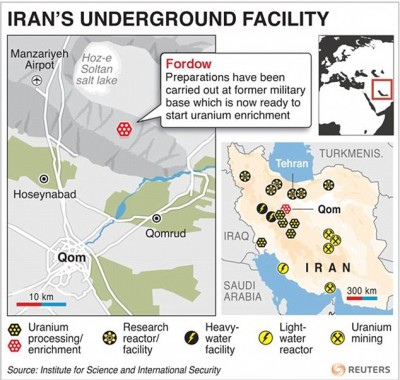 Iran would never agree to shut down its Fordo underground nuclear enrichment facility as demanded by world powers and it has not halted its most sensitive uranium enrichment work, a prominent Iranian lawmaker said Sunday.
Iran would never agree to shut down its Fordo underground nuclear enrichment facility as demanded by world powers and it has not halted its most sensitive uranium enrichment work, a prominent Iranian lawmaker said Sunday.
“It is possible that they [world powers] set some conditions such as shutting down Fordo, which definitely will not happen,” Mehr quoted Alaeddin Boroujerdi, head of the parliament’s foreign policy committee, as saying.
Fordo, with nearly 3,000 centrifuges and dug deep into a mountain near the holy city of Qom, some 150 kilometers (90 miles) south of Tehran, is at the heart of international concerns over Iran’s nuclear drive.
The site, whose existence was revealed in 2009, began in late 2011 to enrich uranium to purities of 20 percent, a few technical steps away from the 90-percent level needed for a nuclear weapon.

Permanent U.N. Security Council members Britain, China, France, Russia and the United States plus Germany have all called Tehran to close Fordo or limit its enrichment activists.
Alaeddin also added that “enrichment to 20 percent is continuing,” state news agency IRNA quoted him as saying.
Diplomats accredited to the U.N. nuclear watchdog said on Friday they had no information to substantiate the report that Tehran had halted enrichment of uranium to 20 percent, Reuters reported. Israel also dismissed the original report as “irrelevant.”
Iran says it is enriching to this level to provide fuel for the Tehran Research Reactor, which produces medical isotopes, and denies seeking or ever having sought nuclear weapons.
Iran and the P5+1 resumed talks mid-October in Geneva during which Tehran presented a new proposal that its chief nuclear negotiator Abbass Araqchi said could settle the dispute “within a year.”
In return, the powers are offering to ease some sanctions against the Islamic republic, such as those imposed on trade in gold and on the petrochemical sector.
Netanyahu’s warnings on Iran
Israeli Prime Minister Benjamin Netanyahu, whose country is widely believed to be the Middle East’s only nuclear power, has cautioned against any premature lifting of sanctions in the new diplomatic engagement with Iran.
“Iran must be stripped of its enrichment capability and its heavy water plant,” Reuters quoted Netanyahu as saying.
He also warned that Iran is capable of converting low-grade uranium to weapons-grade within weeks.
“The important part stems from technological improvements which allow Iran to enrich uranium from 3.5 percent to 90 percent in a number of weeks,” Agence France-Presse quoted him as saying.
“Iran is prepared to give up enriching uranium to 20 percent and therefore debate on this subject is unimportant,” he added.
On Wednesday, Netanyahu discussed Iran with U.S. Secretary of State John Kerry in Rome.
Some experts warn that Iran next year may reach “critical capacity” — the point at which it could, in theory, process enough weapons-grade uranium for a bomb before being detected.
However, experts from both sides are to meet at the end of this week in Vienna to prepare for the next round of talks, in Geneva on November 7-8.
Boroujerdi, meanwhile, warned against any military action, saying Iran was prepared to deter any foreign attack without giving any elaboration.
“We have created the conditions for America and the Zionist regime in a way that they will never think of attacking our nuclear sites. Our missiles are a deterrent … but Fordo is one of our red lines,” AFP quoted him as saying.
Al Arabiya

Leave a Reply
You must be logged in to post a comment.